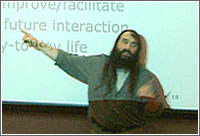|
![]()



Abstract
You used to know where you were with computers and things: you pressed a key and the text changed, you flicked the light switch and the light went on. But things are changing: you walk into a room and the light switches on for you; you are typing happily into your computer and a bouncy paper clip asks whether you are writing a letter.
Incidental interaction refers to those times when a system observes your behaviour and then in some way acts in a way that is (hopefully!) helpful … but was not something you explicitly requested. This includes things in the physical environment such as the light that switches on (often called ambient intelligence) and also things in the digital world such as the way Amazon suggest what books you might like to look at based on your own and other people's past choices.
With standard intentional interaction you are in control of the system, you know when it is going to do something, you know what you expect it to do and so you can assess whether it is the right thing. With incidental interaction it is hard to know when or why an action has occurred.
This form of behaviour is getting more common from the TiVo box to toilet taps. How do people understand such interactions? How do we design for them?